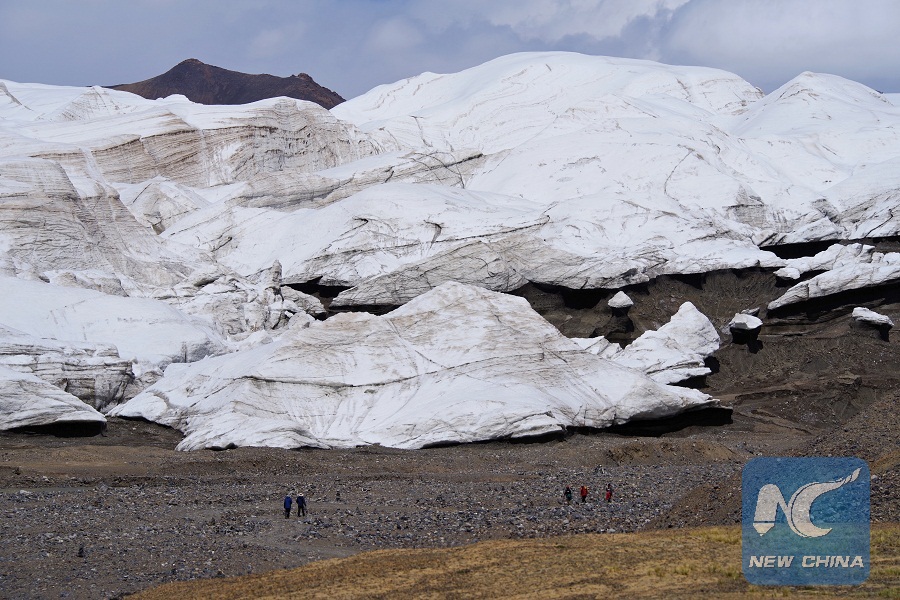
Scientists investigate at the foot of Purog Kangri Glacier in the Qiangtang nature reserve, southwest China's Tibet Autonomous Region, July 9, 2017. (Xinhua/Liu Dongjun)
BONN, Nov. 8 (Xinhua) -- The ongoing 23rd Conference of Parties (COP 23) to the United Nations Framework Convention on Climate Change (UNFCCC) has garnered worldwide attention as it is crucial to the implementation of the Paris Agreement which will direct the global efforts in climate protection beyond 2020.
During the conference which kicked off on Monday and will last until Nov. 17, China's stance and Fijian presidency, among various highlights, merit additional attention.
CRUCIAL TIME
At a press conference of the Chinese delegation held in Bonn on Monday, Lu Xinming, a negotiator from the National Development and Reform Commission (NDRC), said the Bonn meeting comes at a crucial time both for defining implementation guidelines of the Paris Agreement and also for battling the climate change across the globe.
As negotiations on detailed implementation plans of the Paris Agreement are expected to conclude on the COP 24 in 2018, talks at the Bonn meeting will lay crucial building blocks for the final reaching of consensus.
Lu said that the Bonn meeting is also an occasion for reality check of progresses in climate promises and actions. The global fight against climate change, starting from 1992 with the inception of the UNFCCC, can be divided into pre-2020 phase and years after that, therefore, the international community needs to take stock of pre-2020 climate progresses in Bonn.
The good news is that common understanding has been achieved such as that the climate change is taking place and it poses a threat that no country can solve single-handedly, said Gou Haibo, another Chinese negotiator from the Chinese Ministry of Foreign Affairs.
CHINA STANCE
China had submitted five proposals to the meeting on implementing the Paris Agreement, which has demonstrated the country's "proactive attitude in participating in and guiding the global climate negotiations", Lu said.
Besides, an emphasis on flexibility for developing countries, as is mentioned in the Paris Agreement, has also been featured in China's proposals, Lu added.
For his part, Gou emphasized that China's proposals held on to the principal of "common but differentiated responsibilities" and featured a comprehensive approach to mitigation, adaptation, finance and capacity building.
Gou further noted that participating in international cooperation on climate change as a developing country, China will continue making contributions to the global initiative through recognizing the general trend of a green and low-carbon development and endorsing the Paris Agreement which embodies such a trend, "taking good care of its domestic development in the climate field", and also through stepping up south to south cooperation.
The crux of the problem for all countries is the possibility to combine climate actions with domestic development, Gou said, for China, climate protection is an "intrinsic requirement" of its own sustainable development as well as its endeavor to build a beautiful China.
FIJIAN PRESIDENCY
At the Bonn meeting, Fiji has the Presidency of COP 23, whilst the government of Germany provides logistical resources.
Fiji is the first small island developing country to hold the presidency of the COP meeting. The climate change conference, though held in Bonn, features various Fijian elements, the most noticeable one being the naming of one of the two conference zones after "Bula", a Fijian word for hello as well as a blessing of health and happiness.
Meanwhile, Fiji also aimed at interweaving the Fijian concept of "talanoa" -- meaning storytelling and dialogue -- into the climate negotiations and consultations, in the hope that there will be a process of inclusive, participatory and transparent dialogue.
Presiding over the opening ceremony on Monday, Frank Bainimarama, the prime minister of Fiji, said "the human suffering caused by intensifying hurricanes, wildfires, droughts, floods and threats to food security caused by climate change mean there is no time to waste".
"We must preserve the global consensus for decisive action enshrined in the Paris Agreement and aim for the most ambitious part of that target -- to limit the global average temperature rise to 1.5 degrees above that of the pre-industrial age," he said.
The Paris Agreement, achieved in 2015, aims to tackle global climate change by cutting greenhouse gas emissions and sets a global target of keeping the average temperature rise no higher than two degrees Celsius above pre-industrial levels.

